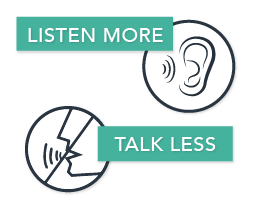
Talking to your children about drugs is likely one of the hardest conversations you will ever have. While you want to protect them, you also want to have an honest and engaging conversation that provides them with reliable information and support, so that they may make positive choices in the future.
The good news is, in comparison to a younger child, teens have a larger vocabulary, are able to understand more concepts, and see the world in more nuanced ways. This presents an opportunity to talk more openly and connect with them in a manner that goes beyond simply saying “drugs are bad.” While this may be uncomfortable or daunting, remember, it is both an opportunity to become closer to your teen and invest in their future.
Draw On Your Unique Understanding Of Your Teen
The first thing to remind yourself, is that you likely know your child best, and if you feel like they have drifted away, this is an opportunity to reconnect with them and understand the scope of their life. Although they may be going through many changes, and at times may seem very different from the child you remember, chances are, you still know them better than anyone else. Use that knowledge now.
Lastly, look at their life—are there any specific demands, challenges, or pressures they may be facing that might push them towards drug use that you should talk about? Examples include significant life transitions like a divorce, or a breakup. According to the National Institute on Drug Abuse, teens are increasingly using stimulants, such as Adderall, to address their concerns about weight loss, or as a study aid.
Recognize Their Capability
Teens are a lot more aware, both of the world, and of their own thoughts, feelings, and bodies than preadolescents are. This added cognitive, emotional, and rational capacity can increase the content and the dynamic of the conversation, especially if your teen gets the sense that you recognize and respect this capacity for understanding.
At this age they will comprehend more, be able to see others points of view, and imagine different situations in which they may find themselves. It is quite likely they will be evaluating the information you are giving them, comparing it to what they have learned, and possibly even experienced. Taking this into account, and being open to integrating it into a conversation, may help further the exchange and foster a greater receptiveness between you both.
Understanding How Their Outlook Is Shaped
Teens are generally more sensitive to peer pressure, and may be prone to feeling like they are the subject of everyone’s attention, when most likely they are not. In psychology, some refer to this concept as the “invisible audience,” that is, a teenager may feel as if their peers are always watching and judging them.
It is true however, that peer pressure can also present unique challenges and opportunities for your child in terms of drug exposure. At this age, they may find themselves amidst conversations of drug use, witness it, or even be cajoled by their peers to experiment.
Taking the time to note and encourage their individual attributes, strengths, and positive characteristics may help to bolster their confidence, self-respect, and commitment to self-care, as well as fostering a more comfortable dialogue between the two of you.
The Role Of Cognitive Development
An important thing to consider, both in terms of how drugs affect a teen, and how they will perceive and comprehend drug use, and the subsequent conversations about it, is the development of the teen’s mind.
Despite a greater awareness in comparison to preadolescents, at this age, your child’s brain is still developing. Critical changes are still occurring, and certain areas of the brain that affect learning, memory, motivation, and other things, are not yet poised to function in the capacity that an adult brain does.
 In example, the prefrontal cortex, an area that is responsible for controlling a person’s ability to thoroughly reason and control impulses, doesn’t completely develop until around age 25. What this means, is that they may not be able to completely rationalize the impact of their actions or choices, or fully put together everything you are sharing with them.
In example, the prefrontal cortex, an area that is responsible for controlling a person’s ability to thoroughly reason and control impulses, doesn’t completely develop until around age 25. What this means, is that they may not be able to completely rationalize the impact of their actions or choices, or fully put together everything you are sharing with them.
It may be hard for them to see past the present and truly grasp or imagine the consequences to their actions, even the life changing ones. This does not mean you shouldn’t talk about the consequences, but only that you need to be patient, and explain things in a way that they can understand.
How To Begin The Conversation
In general, listening more and talking less is a good strategy in starting any conversation. Once you establish a rapport, and your teen begins to open up, you can begin to interject in greater detail about your worries and with information you’d like to share.
A good way to start this conversation is by asking your teen about what they know, specifically how they might have encountered or witnessed drug use or conversations. Asking them if they have questions about drugs may be a good opening tactic as well.
The idea is to start a conversation that invites them to talk openly, by being part of the dialog, rather than just being talked at. If you come at them with what they perceive to be an intent to lecture, you might lose their attention and openness.
Be Prepared
Ask questions, but be ready for the answers, as hard as that may be. Asking questions and seeking clarification opens the door for your teen to talk more and makes it less likely that they will get defensive or shut down while you are talking. This is vital. Your teen may tell you things you wish you did not hear, despite this, it is important information that allows you to better protect, guide, and support your child.
 Listen carefully, remember what you are hearing, and strive to not react too strongly or become judgmental. Becoming overly emotional, angry, or blameful can cause your teen to end the conversation before it’s even really started, taking away what could be a critical opportunity for prevention, or even intervention.
Listen carefully, remember what you are hearing, and strive to not react too strongly or become judgmental. Becoming overly emotional, angry, or blameful can cause your teen to end the conversation before it’s even really started, taking away what could be a critical opportunity for prevention, or even intervention.
Be Informed
Be ready to back up what you say with evidence. In many ways, information is the currency of youth, and if your teen gets the sense that you are being dishonest, or are trying to gloss over something by simply saying that it’s bad, the conversation may become argumentative, or your teen may begin to stop listening.
Some of the references provided here give a good summary of substance abuse statistics within the youth and high school population. In addition, the National Institute on Drug Abuse (NIDA) has developed a great resource for teens and their families that hosts a wide variety of information on teen drug use and education. Take the time to become comfortable with this or other information, or be ready to look up the information together with your teen.

What Not to Do
Don’t panic. This is probably just as tough for them as it is for you, albeit probably for different reasons. Remind yourself that you need to do this, and that you are doing it for your child’s health and future. According to NIDA, you are still the best defense against drug abuse—having an active and engaged parent puts the child at significantly less risk to develop a substance use disorder.
Do not lie to your child. It may be very tempting to get out of hard conversations or skip over difficult subjects by being dishonest, such as lying about your own drug use history. If your child ever finds this out, you could lose a lot of credibility, which could inhibit your chances of having a productive conversation in the future.
Keep in mind, you can choose to not answer questions, as you do not have to be completely open about everything, in fact, doing so may be detrimental, as too much information may overwhelm your child or encourage them. However, speaking honestly about your experiences with drugs may give you an advantage within this conversation. This article gives you some tips on how to handle this conversation, as well as illustrating how you could choose to integrate your own experiences into your talk.
Let Us Help You Support Your Child
Take the time to talk to your teen about drugs, and be sincere and upfront with them. If you don’t feel comfortable or knowledgeable enough to do this, we can help. If you, yourself, struggle from substance abuse or addiction, we can help you to find ways to have a productive talk with your teen about drugs, and direct you  towards treatment options.
towards treatment options.
If you’re worried that your teen may be abusing drugs or alcohol, contact us today. We can help to equip you, so that you can get your teen the help they need to get their life back on track.
Sources
Partnership for Drug-Free Kids — Behavior & the Teen Brain
Partnership for Drug-Free Kids — How to Talk to Your Kids About Drugs If You Did Drugs
KidsHealth.org — Talking to Your Child About Drugs
National Institute on Drug Abuse — Drug Facts: High School and Youth Trends
National Institute on Drug Abuse — Preventing Drug Abuse: The Best Strategy
